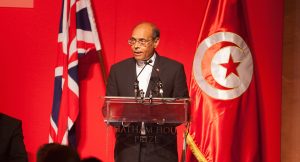Dr. Mohamed Moncef Marzouki served as the interim President of Tunisia between 2011 and 2014, following the Tunisian Revolution. He is best known for his role in establishing the national Truth and Dignity Commission to investigate violations of human rights and provide reparations to victims. Dr. Marzouki has also founded and held leadership in several activist organizations, including the African Network for Prevention of Child Abuse and the Tunisian League for Human Rights.
Harvard Political Review: You were very critical of Western governments that support authoritarian regimes. What do you think would be a more successful approach to promoting democracy in the Middle East?
Dr. Moncef Marzouki: Looking at Iraq, the intervention destroyed the country. Now, you have a fake democracy; you have a corrupt democracy; you have the worst form of democracy in the world. The foreign intervention to impose democracy is totally counterproductive. Democracy must come from within society: even if it takes more time, it is not important. Give the population the means to fight the dictatorship from the inside but never intervene from the outside.
The idea that Western governments have about stability is completely wrong, because they stick to the idea that supporting a dictator would lead to a kind of stability and this is not important for them. In fact, the side effects of this policy are extremely harmful, of course for the population living under the dictatorship, but it is even harmful to the Western governments. You are suffering from terrorism as we are suffering from terrorism. Terrorism is just one of the side effects of this policy of supporting dictatorship. You cannot, on one hand, pretend to fight against terrorism and, on the other hand, feed the very reason that it happens. It is a counterproductive policy, and I would say that it is a stupid policy.
HPR: During your time as President, what were your priorities as the interim democratic leader after the revolution?
MM: Our main problem was the constitution. The constitution determines the kind of state we want, what kind of society we want for the next generation. Of course, the United States does not have this problem because its constitution has existed for two centuries, but writing a constitution in a divided society is an extremely complex task.
We had this divide between secularists and Islamists, a gap between generations, et cetera. Reaching a consensus was extremely difficult, but necessary because you cannot have a stable country without consensus about the state. Our main objective was to promote job creation for young people, economic growth, and so forth. However, you cannot have economic growth without a stable country, and you cannot have a stable country without a good constitution that everyone has accepted.
My priority during the three years I served as President of Tunisia was to reach a consensus about this constitution, and I can assure you that we spent hours and hours—months, even—in our discussion. My main obsession is to prevent the new generation from having to suffer from dictatorship. When you say, “we don’t want more dictatorship,” how can you implement a check-and-balance system so you can prevent the next potential dictatorship? How should the president be? We have decided that the president cannot run for more than two terms, whereas in the old constitution, the president could run for as many terms as he wanted. We put in the constitution that everything can be changed except this rule.
HPR: As a leader, how do you balance human rights priorities with national security concerns and government stability?
MM: I have faced this problem many times, especially under the threat of terrorist attacks. Even under these difficult circumstances, I used to tell the military and the police to be very careful, because I did not want any kind of human rights abuse, any kind of torture. This was not only for ethical reasons but also for political reasons, because I believe that torture is one of the main problems behind terrorist attacks. Imagine that you arrest 100 people, and you submit them to torture, 90 percent might give you some information, but the other 10 percent become your worst enemy. They would become tough and determined to destroy you. Even if by torture you can have some small benefits, the impact of torture, not only on them, is extremely dangerous.
The other problem is the death penalty. I have always been opposed to the death penalty. During my presidency, no one was hanged. I tried my best to ensure that Tunisia would get rid of the death penalty in the constitution, but I could not, because our society is still very conservative.
Image Source: Wikimedia Commons
